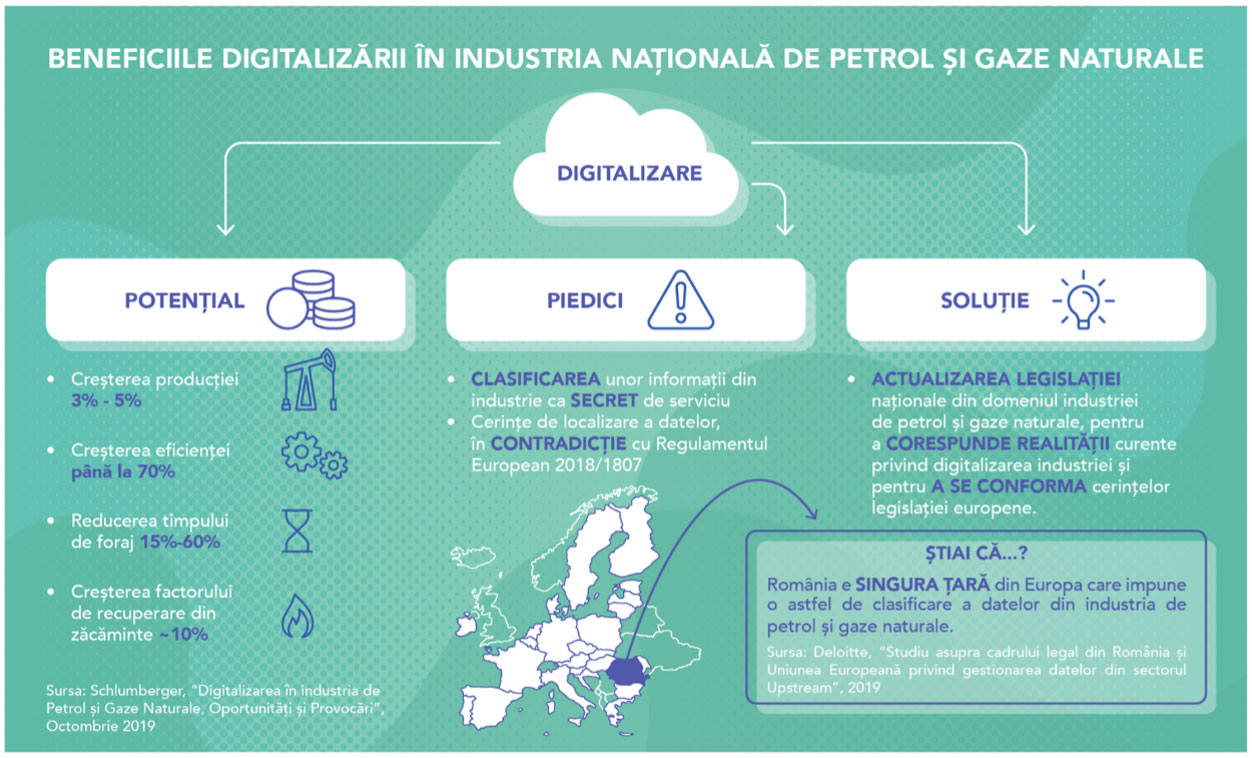In the age of digital technology, rapid access to applications and big data is becoming the "fuel" for the development of the oil and gas industry. Digital transformation has already become the norm globally, but unfortunately, due to legislative hurdles, Romania has missed the start in the digitization process of the oil and gas industry and will incur higher costs to catch up.
For more than a century, the local oil and gas industry has contributed to the economic and social development of the country, providing fuel for lighting, heating, transportation, jobs and substantial revenues to the state budget. Since the first well drilled in Romania in 1861, with a wooden casing and a drill, the local oil and gas industry has continuously innovated to keep up with demand, with technologies applied over decades, at the highest level in Europe and beyond.
What is needed now is legislative change to make it possible to move into a new phase of digital transformation, a wave that has already swept the industry globally. "The need to use advanced information technology tools is all the more pressing in the case of Romania, which has mature deposits with a significant natural decline in production", reports the Federation of Oil and Gas Employers (FPPG).
The intensive exploitation of deposits is taking its toll. Today most fields are mature and fragmented, with production per well one of the lowest in Europe. Digital technologies are one of the key solutions to reduce the natural decline in production, while streamlining operators' costs, with benefits including for final consumers. Their adoption is all the more necessary as the oil and gas industry has been hit hard by the pandemic, and the decarbonizing climate agenda poses new challenges and brings fierce competition with new energy sources. Increasing cost efficiency is therefore essential in this context.
Here, in the infographic below, are the main benefits of digitalization for the local oil and gas industry:
Digital is rewriting industries' operational landscape
Globally, industries are embracing digital technology to reshape their operations and reap the benefits. "Digital technologies are helping almost every industry rewrite its operational landscape, and The oil and gas industry can no longer be left behind. The potential benefits of digital transformation are clear - higher productivity, safer operations and cost savings", says a study by Deloitte ("From bits to barrels. Digital transformation in oil and gas production").
- The use of technologies such as cloud computing, big data analytics is the status quo today and represents huge potential for the oil and gas sector. Big data & analytics helps innovation by supporting companies in analyzing large amounts of structured and unstructured data from disparate sources, generating understanding them in real time.
"Combining these technologies in innovative ways can exponentially amplify their capabilities. The combined impact will soon add a new level of connected intelligence operations in the oil and gas sector"WEF study ("Digital Transformation Initiative. Oil and Gas Industry", 2017).
Here is just one example of the benefits of using big data & analytics:
"Modern offshore drilling rigs have around 80,000 sensors, which are expected to generate around 15 petabytes (or 15 million gigabytes) of data over the lifetime of an asset. Big data & analytics will help companies navigate this enormous amount of data", adds the WEF study.
Real-time information received from sensors in the field (Internet of Things - IoT) is also driving the accumulation of a huge amount of data, and the use of cloud computing platforms can lead to Faster and smarter decisions, a key aspect for reducing costs and capitalizing on business opportunities in an industry with high climate agenda challengeswhich focuses on decarbonization and zero-emission energy sources.
Romania stuck in the era of documents sent by military mail
Therefore, data generation and transmission, data analysis and storage are the enablers of digital transformation. Unfortunately, the classification of some data as a "secret service", imposed by Romanian legislation, makes it difficult to use and capitalize on them through cloud technologies, and is also a huge operational obstacle.
"There is a disconnect between the need for digitization of the oil and gas industry and certain elements of the legislation in place, a disconnect specifically given that in the upstream (exploration & production) sector, certain data is classified information. This makes it difficult to manage these documents, they are kept in specially equipped data rooms for this purpose, and their transportation and movement is by military mail only. Thus, the most up-to-date technological solutions, such as the cloud, cannot be used for these documents, what is blocking the digitalization process in industry. This in the context that, at EU level, a Regulation has been in place since 2018 which expressly provides for free movement of non-personal data within the EU", explains Oana Bucur, Task Force Leader Digitization at FPPG (source, HERE).
Incidentally, Romania is the only country that maintains territoriality requirements for upstream industry specific data, according to a 2019 Deloitte study - "Study on the legal framework in Romania and the European Union for data management in the upstream sector".
"This goes against the European trend of removing restrictions and barriers on the transfer, use, storage, processing and access to non-personal data", notes the FPPG.
Oil industry companies have repeatedly signaled the importance of declassifying oil industry data and information, without which digitalization is inaccessible to Romanian companies. They called for solutions from the authorities to support the development of an industry that provides many jobs and significant revenues for the state budget (find more details HERE).
"The legislation in force must be amended in order to declassify data and documents that oil companies frequently work with and which, due to their classified status, are difficult to manage and impossible to digitize"adds Oana Bucur.
On an issue as important as digitization, the Government needs to support the industry's efforts to catch up with European trends.
Open dialogue and a joint approach to the challenges and opportunities generated by the digital transformation will maximize the benefits of the new "revolution". And the time for action is now, in order to catch up with the gaps already registered by the Romanian oil and gas industry, for the benefit of both the state and the citizens.






